buried 7th July 1900 Wembdon Road Cemetery
by Jillian Trethewey, Hilary Southall and Clare Spicer 8/12/2020
Augustus Marinus Thomas Newswag (Nieuwzaag) had Dutch heritage as indicated by his surname, but he was born in Wales. The career he chose demanded absolute loyalty to the British crown.
Augustus was born in Cardiff, Wales, on the 15th April 1866, the son of Roelof Newswag and his wife Louisa nee Brasseur, who was French. Roelof was born in Holland in about 1828 and was a mariner on ships sailing between Europe, the British Isles and North America. In 1871 Roelof and Louisa were living in Cardiff with their young family, including Augustus aged four. Roelof was a boarding clerk for a ship-chandler, so living ashore and responsible for provisioning ships with food, water and supplies for the next voyage. For some reason this didn’t last and Irish shipping lists show that Roelof was at sea again as an able-seaman between 1872 and 1875.
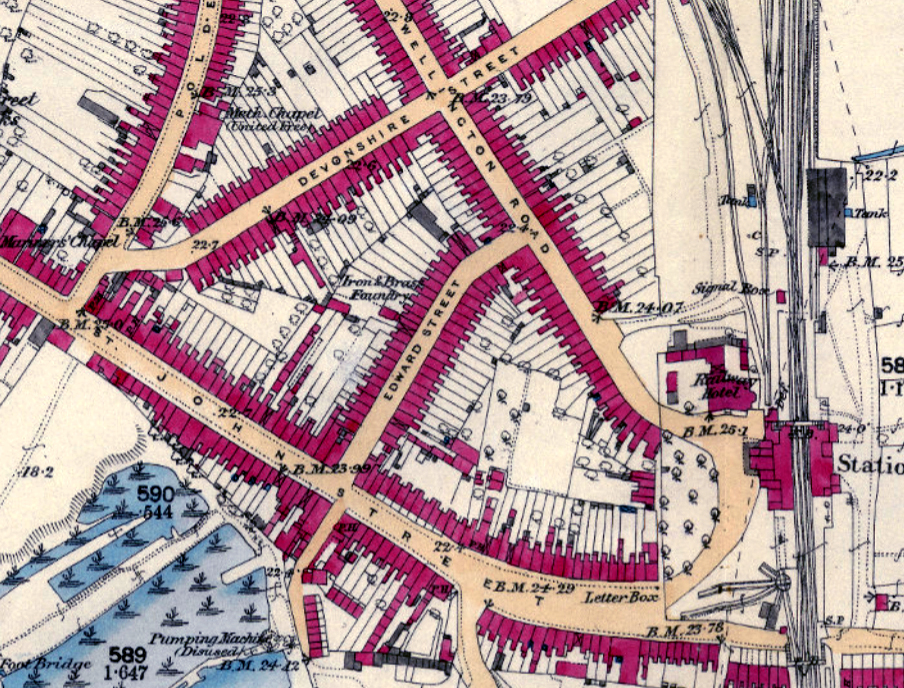
Soon after 1875, Roelof, Louisa and their six children left Cardiff and travelled either 68 miles by road or probably half that by sea, to settle in Bridgwater. In the 1881 census Roelof, now Richard, was a labourer living at Edward St with Louisa and children. Augustus, stated to be seventeen but actually just fifteen, was an engineer in a carriage works. But life at sea must have been in his blood because the following year, Augustus enlisted in the Royal Marine Light Infantry. Augustus gave his birthdate as 22nd July 1863, which on 22nd August 1882, would have made him nineteen, but in fact he was only sixteen.
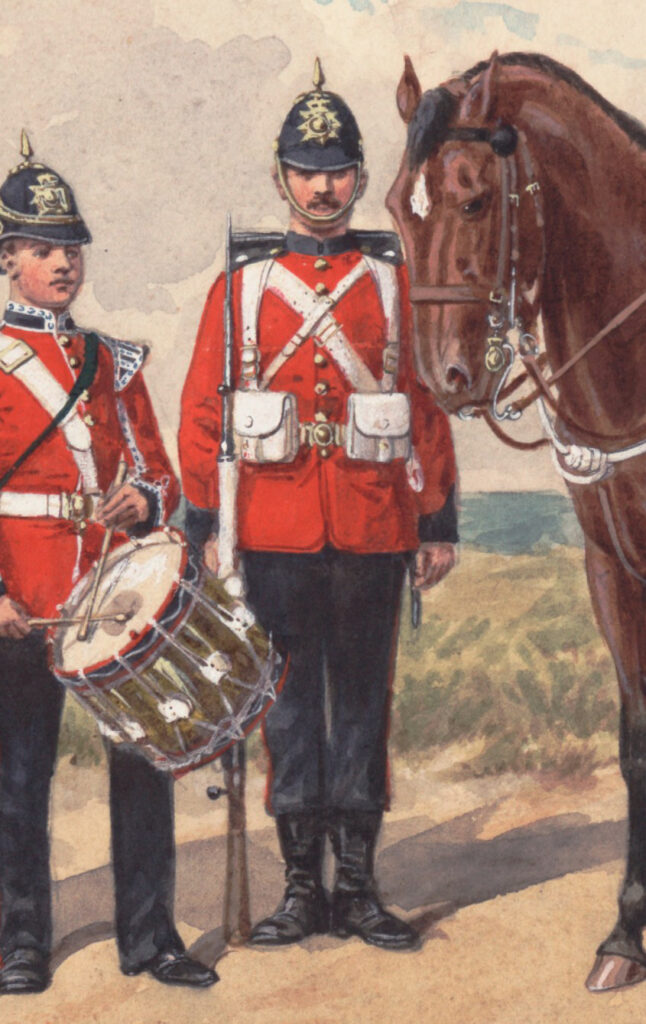
The Royal Marines were marine infantry forces, the soldiers, on Royal Navy ships. They began as the Duke of York and Albany's Maritime Regiment of Foot in 1664 and have a proud tradition. In 1862 they were renamed the Royal Marine Light Infantry. They fought the enemy at sea. On land their role was to be the vanguard, seek out the enemy and begin the attack, with the main naval or other forces following behind. On enlistment at Bristol, Augustus was 5 foot 6 ½ inches in height, with a fresh complexion, brown hair and blue eyes. His young age would explain why on discharge his height was 5 foot 8 ½ inches! He was unable to swim. He was given the service number 2404S and sent to the Plymouth Division Recruit Depot.
Augustus was an exemplary recruit, especially in gunnery. His service record has survived in The National Archives and provides details of his career. Pte Newswag, 12th Company, embarked on his first voyage on 9th Feb 1884 to join the Royal Marine Battalion in Egypt which was part of the army of occupation following the Anglo-Egyptian war of 1882. The Suez Canal was important to British trade with India and beyond and Britain was prepared to fight to keep the shipping lanes open. Egypt’s major port, Alexandria, had many European settlers and Augustus would have safely marched along the streets and seen much that was new and exciting.
However the Mahdist Sudanese forces were still fighting the British and Egyptian armies for control of the Red Sea. There were battles at El Teb, Sudan, on the 4th and the 29th February 1884. If Augustus had not arrived in Egypt and Sudan in time for the second battle of El Teb, he was present for the fierce, hard-fought battle of Tamai on the 13th March 1884.
Tamai was inland in the eastern Sudan desert, about fifty miles from the coastal town of Suakin. It must have been like an oven. Port Said was many miles to the north and Aden was many miles to the south. It was very remote. Osman Digna led a Mahdist Sudanese army of about 10,000 men. The British had 4,500 men but were better armed. The British won the battle but at the cost of over 200 men, plus others injured. The Mahdists suffered heavy losses and their influence in the region was weakened, but only temporarily. At the same time another Mahdist army lay siege to Khartoum where General Gordon , his soldiers and civilian residents waited desperately for a relief expedition.
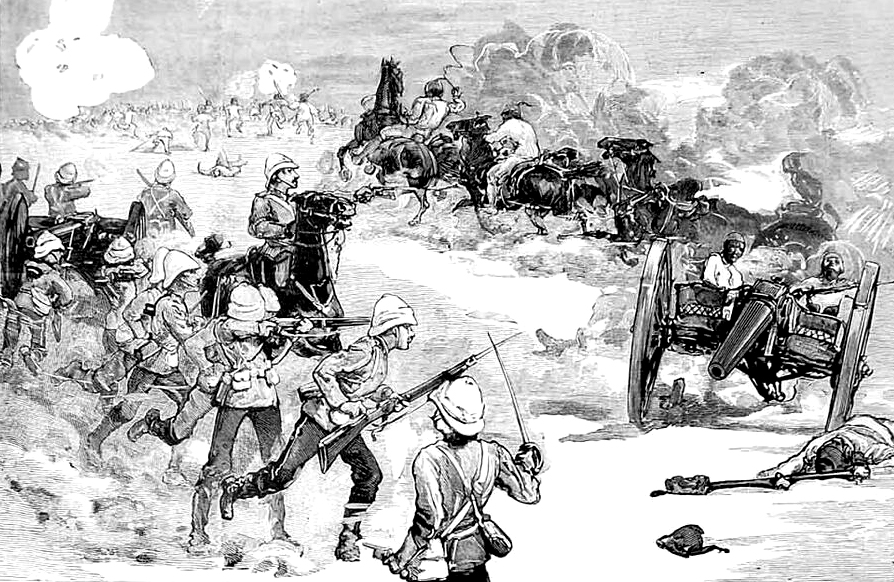
Augustus may have participated in further fighting and no doubt did his share of garrison duties, but then disease, the enemy of all armies, attacked. On 27th September 1884 Augustus was admitted to the Ramleh hospital in Alexandria with fever. He may have been cheered by the Good Conduct Badge awarded to him. A certain number of these badges meant a man qualified for increased pay. On the 18th December 1884, he was officially invalided home with ‘debilitating fever’. All along his character was ‘very good’. He returned to Plymouth and cold weather on the 6th January 1885.
By mid-May Augustus had recovered from his fever and was assigned to general duties at Devonport, near Plymouth. By October he was well enough to go to sea on HMS Hotspur. This was an ironclad ship built to ram other ships, but she was too slow and generally couldn’t catch them. She was part of the Particular Service Squadron of 1885 which trained at Berehaven, Ireland, in case of war with Russia. The training went well but the squadron was not needed after all. His next ship was HMS Neptune, a coastguard ship at Holyhead, Wales, just for a few months. During this time, Augustus received the Egypt Medal and Bronze Star for his service in Egypt and Sudan. By March 1888, Augustus was back in Plymouth with a second Bronze star and another Good Conduct Badge.
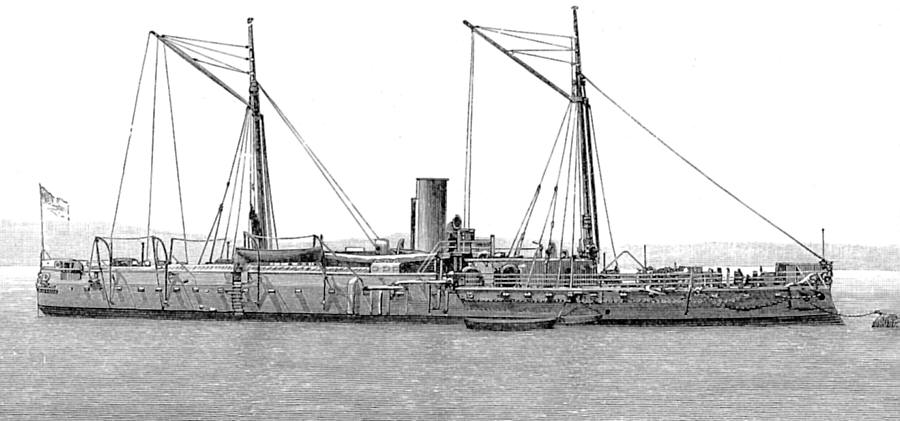
May 1888 was the beginning of the next big adventure for Augustus. He joined HMS Orlando, the flagship of Rear Admiral Henry Fairfax, and sailed south. Prior to 1901, the Royal Navy had the duty of protecting Australian waters. For the next three years, Augustus was far from home sailing around Australia and New Zealand. For most of this time he served on HMS Orlando, but he spent short periods each on HMS Opal and HMS Egeria, in the same squadron. He received another Good Conduct Badge, but any fighting was likely in the course of hauling drunken sailors back onto the ship, or perhaps boarding a suspicious vessel. Augustus successfully completed a musketry course in Hobart in January 1891. Augustus must have enjoyed some of the pleasures available in port. In February 1891 he was diagnosed with the ‘sequel to gonorrhoea’ and invalided home.
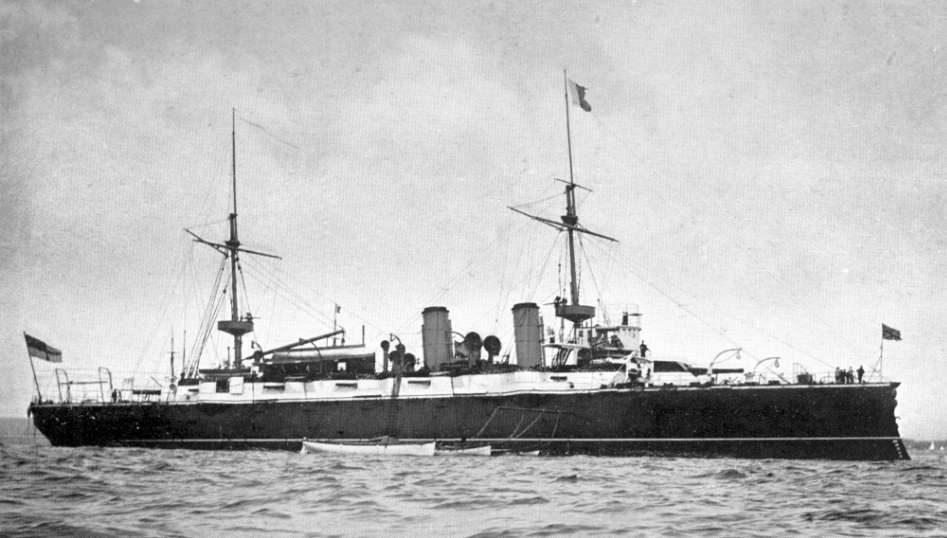
HMS Penguin took Augustus back to Plymouth, where he was discharged from the Royal Marines with £15.00 in his pocket on the 18th September 1891.
Augustus returned to Bridgwater, but in the meantime his parents and siblings had moved back to Wales. His brothers were boilermakers in the shipbuilding industry there and are mentioned in newspaper reports occasionally in connection with support for injured workers.
Augustus chose to remain in Somerset and became a village police constable. With his experience in the Royal Marines he would have been a good choice. The Somerset Constabulary was formed in 1856. Prior to this, larger towns like Bridgwater had a Borough Police Force, but the smaller parishes were still relying on a parish constable. A county wide police force was a more modern approach to policing with better training, better exchange of information and better co-operation with other police forces both across the county and nationally.
In mid-1892, Augustus married Lydia Slocombe, the daughter of a sawyer. Lydia was born not far from Bridgwater at Northmoor Green in about 1865. There were no children.
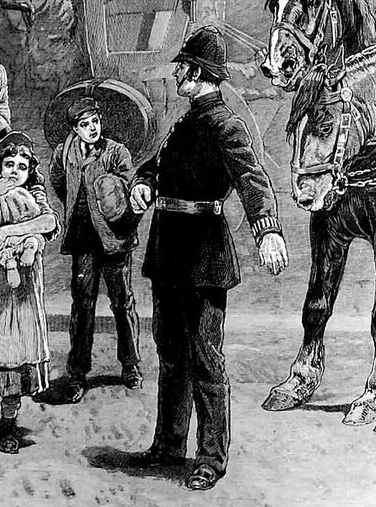
Augustus features in a number of local newspaper reports of court cases. From those reports, it can be deduced that he was stationed in Yeovilton, West Camel, Walton and by 1895, Moorlinch. He was dealing with many minor offences that came before the Bench at the Somerton Petty Sessions.
“Joseph Manley, a farmer of Yeovilton, was summoned for allowing a heifer to stray on the highway at Yeovilton, on the 4th of July.—PC. Newswag stated the facts. Fined Is and costs. Robert Ford, a dealer of West Camel, was summoned for a like offence at West Camel, on the 1st July, the animal complained of being a horse. -P.C. Newswag proved the case, and the defendant, who pleaded guilty, was fined 2s 6d and costs.” 12 August 1892 - Western Chronicle, Yeovil 12th August 1892.
“Alfred Knight, labourer, of West Camel, who did not appear, was summoned for having been drunk on the 19th of June.—P. C. Newswag proved the service of the summons, and stated that defendant was lying in the road, drunk and incapable.—Fined 3s, and 6s costs.”
Taunton Courier, Taunton, Somerset, 5th July 1893.
“Thomas Brown, a young man of Walton, was summoned for using obscene language on Thursday, the 5th inst.. on the highway in the parish of Walton. P.C. Newswag stated that on the evening in question there was something going on at the school-rooms. There were about a dozen people outside. Defendant, who had had a little drop too much, made use of very bad language. Defendant admitted the offence, and this being the first time he had been before the Bench, he was fined in the mitigated penalty of 2s 6d and 6s costs.” Taunton Courier, Taunton, 25th October 1893.
Other offenders included a man fined for riding on the highway with no reins, a publican who assaulted Augustus, and a farmer who had two dogs and only one dog licence. The farmer foolishly had tried to convince P.C. Newswag that the second, fully grown dog, was just a new pup.
There was one serious incident and this ended his career, as described briefly in the Somerset Chief Constable’s Report, in the Central Somerset Gazette, 9th January 1897:
“……… and £11 10s 6d a year to 2nd Class Constable Augustus Newswag, aged 30, whose approved service is five years, and whose pay is £57 12s 8d per annum. This constable has been rendered unfit for further service by an injury (the loss of an eye) received without his own default in the execution of his duty. The injury was accidental and the disablement partial.”
Augustus died aged 36 at 15 Barclay St, Bridgwater, on the 4th July 1900. His wife Lydia was present at his death. Perhaps after his painful injury, Augustus and Lydia moved back to Bridgwater to be closer to the Slocombe family. As described on his death certificate, for the remaining three years of his life, Augustus found work as a carpenter. Perhaps he still had friends in the carriage works where he was employed as a boy. Then sometime in February 1900, at the end of winter, Augustus had a fever and a cough and was diagnosed with influenza. The death certificate states that the influenza continued for five months, with swelling of the liver and ascites (fluid in the abdomen), for three months.
Augustus clearly hadn’t been well enough to work all year, but influenza doesn’t persist for five months. The persistent cough was more likely to be another infection or illness such as worsening heart failure which could also cause the swollen liver and ascites. But what would cause such severe heart failure or any other disease in a seemingly fit, healthy 36 year old? There are many possible causes in the days before antibiotics, but influenza can weaken the heart and trigger heart failure. Perhaps the debilitating fever he contracted in Egypt in 1884 took its toll also.
The 20th October 1900, West Somerset Free Press, Minehead, the Chief Constable:
“On the 4th July last, the death of Augustus Newswag to whom a constable's pension was granted on the 4th January, 1897, and I recommend that the balance of the pension due him at the time of his death be paid to the widow, Lydia Newswag.”
Lydia married a second time to Augustus James Cook.
Let us remember Augustus Newswag as a brave Royal Marine who risked his own life to fight for his country and who later served as a hard-working, respected police constable.
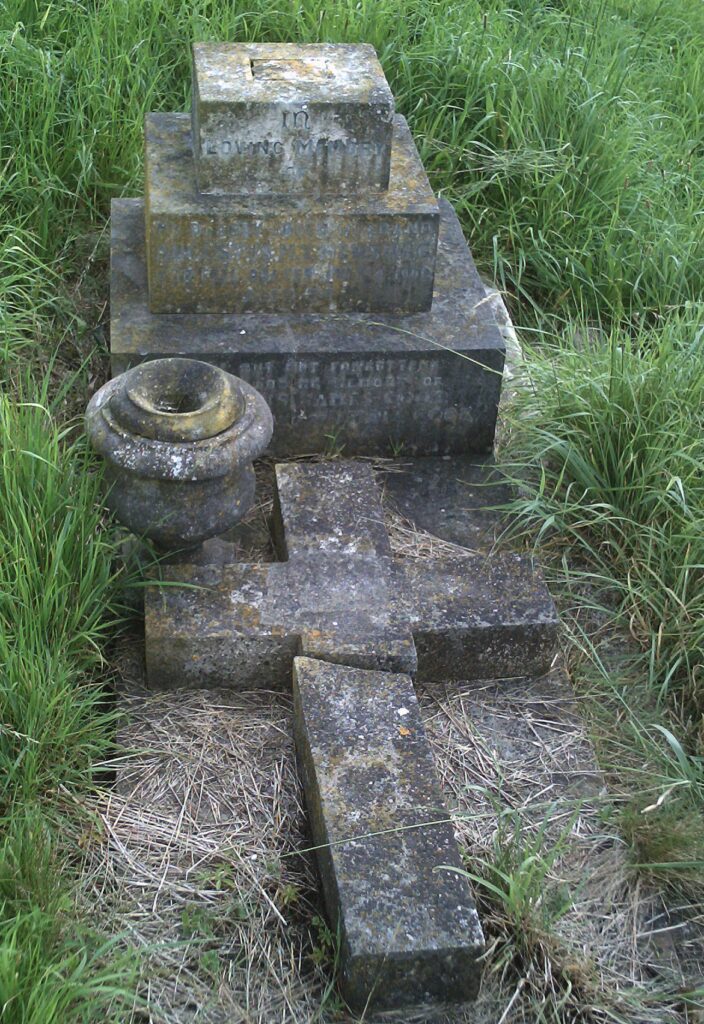
"In Loving Memory of my dearly loved husband Augustus M.T. Newswag
who fell asleep July 4th 1900 aged 34. Gone but not forgotten.
Also In Loving Memory of Augustus James Cook beloved husband of Lydia Cook
who died August 11th 1927 aged 73. In the midst of life we are in death.
Also Lydia Cook who died October 20th 1938 aged 73."
